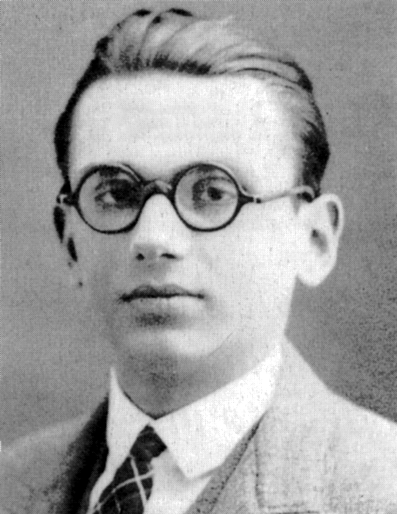
Allana, thanks for laying out all these references like this. Until looking at it all in your chronology, I didn't really get the whole thread of the Modus, but you are right, the supposed mathematical dysfunction is recognizable.
It's Gödel's incompleteness theory.
This spells it out quite clearly:
And yet the execution of the so-called Modus Program demonstrated that any formal system must be both incomplete and unable to establish its own consistency. There is no finite mathematical way to express the property of 'truth.'
That's exactly Gödel's first incompleteness theorem.
You can think of it as the formalized logical equivalent of saying:
"This sentence is false."
The falsity of that sentence is not provable by the logic of the language's meaning. If it is indeed false then actually the sentence is true, but if it is true it cannot be false. There is simply no possible way to resolve the falsehood of that sentence using language logic.
The incompleteness theorem does a similar (though not paradoxical) thing with statements of provability. It basically says:
"Obviously true logical statement X is not provable within Theory Y"
I don't have the math here solid enough myself to get any more descriptive, but this is always true of any set of mathematical proofs assembled into a theoretic framework. There are an infinite number of obviously true logical statements within that Framework that cannot be proved by reference to proofs within that framework. It's not that proofs haven't been found, it's that they cannot be found. They are impossible. It's like impenetrable logical singularities littering the knowableness of everything.
Kurt Gödel published his incompleteness theorem in 1929. It looks like Gibson and Sterling have cast Ada Byron as the Kurt Gödel of 1855. Maybe the disorder of the Grand Napoleon is an analog for the disruption caused by the dawning awareness that human beings can't comprehensively prove the existence of anything. 1932 is known as the Miracle Year in physics as in that one year most of the basic framework of Quantum Physics fell out of the heads of a circle of physicists and mathematicians surrounding Niels Bohr. These fellows were aware of Kurt Gödel and his work. It's as though the introduction of the incontrovertible evidence of the unproveableness lurking inside all of our frameworks of knowledge set off a cascade of insight that undid the certainty underpinning all of human thought.
I need to give this more thought. I'm sure the authors are going for something with this in the context of physical computation.




This ties in with a theme last hinted at in Mallory's deathbed epiphany.
ReplyDeleteThe Engine English, like the Victorians, had a solid sense of their place in the world, and confidence in reason and progress.
Incompleteness means you can't be sure, that you can't know everything.
Mallory, after reading a discouraging report from the Japanese branch of his scientific society -- suggesting that the world is moving on -- reviews a report from British Columbia describing fossils of exotic creatures that have no part on the established great chain of being that leads from the primordial ooze to Englishmen. The tree of life is not a ladder, not even a tree, but a phenomenally complex bush with no privileged path from root to twig.
Mallory dies, not discouraged by the end of the tidy world view that nurtured his career and that he later championed, but awed by the prospect of endless possibility and complexity.
Incompleteness is the next blow to naive reason; is it also the root of the emergent intelligence?
Stefan, I'm sure you have found another key.
ReplyDeleteI'll bet if we were to go back through the book, that we'd find more of this sort of thing hidden in it. The fundamental incompleteness of theory and worldview are is lurking as a unifying theme throughout, I think. Dandy Mick Radley did not account for obscure Texian vengence in the middle of his engine card intrigue with Sam Houston. Captain Swing completely misconstrued the significance of the death of Byron. People are over and over thwarted in this book by their myopic devotion to the world of which they think they have a complete understanding. But their understanding is incomplete. Something from outside of it climbs in the window, or drops artillery shells on the roof.
You could say the modern world began in 1932, when the aspiration of comprehensive knowledge of the universe had to be set aside, and philosophy began to directly grapple with the inherent uncertainty of reality.
Maybe this book is about that. Modernity is born a century sooner, because calculation engines have accelerated math, but mostly because Anne Milbanke tamed Lord Byron and raised her genius daughter in a radically empirical society. Ada's rebellion is incompleteness, and unraveling the arrogant presumption of reason.
Is the hidden conflict in this book between Ada Byron and her mother, and the casualty human certainty?
Oh . . . forgot to mention that the fossils from British Columbia are, or course, the remnants of the Burgess Shale fauna.
ReplyDeleteOne of Sterling's late-80s vintage essays was about these oddities and what they implied about evolution.
There may have been a commentary about science fiction here. The hoary old adventure stories of the Campbell era, with their certainties about science and technology and the superiority of humanity, were becoming as irrelevant as Mallory's scientific society.
But again . . . the loss of certainty brings with it new possibilities. This is what science really offers; not mastery and assurance as in a Heinlein story, but genuine strangeness and danger. To quote Whitehead again, "It is the business of the future to be dangerous, and it is among the merits of science that it equips the future for its duties."
Udaipur Escort Service
ReplyDeleteUDAIPUR ESCORT, UDAIPUR ESCORTS. UDAIPUR ESCORTS SERVICES,ESCORT SERVICE UDAIPUR, ESCORTS IN UDAIPUR, INDEPENDENT UDAIPUR ESCORT, INDEPENDENT ESCORT IN UDAIPUR, UDAIPUR FEMALE ESCORTS. FEMALE ESCORTS IN UDAIPUR, CALL GIRLS IN UDAIPUR, UDAIPUR CALL GIRLS
UDAIPUR ESCORT, UDAIPUR ESCORTS, UDAIPUR ESCORTS SERVICES ESCORT SERVICE UDAIPUR ESCORTS IN UDAIPUR INDEPENDENT UDAIPUR ESCORT INDEPENDENT ESCORT IN UDAIPUR UDAIPUR FEMALE ESCORTS FEMALE ESCORTS IN UDAIPUR CALL GIRLS IN UDAIPUR UDAIPUR CALL GIRLS
Jaipur Escort Service
JAIPUR ESCORT JAIPUR ESCORTS JAIPUR ESCORT SERVICE JAIPUR CALL GIRLS JAIPUR ESCORT , JAIPUR ESCORTS JAIPUR ESCORT SERVICE JAIPUR CALL GIRLS JAIPUR ESCORT JAIPUR ESCORTS JAIPUR ESCORT SERVICE JAIPUR CALL GIRLS
Ajmer Escort Service
AJMER ESCORT AJMER ESCORTS AJMER ESCORT SERVICE AJMER CALL GIRLS
AJMER ESCORT AJMER ESCORTS AJMER ESCORT SERVICE AJMER CALL GIRLS